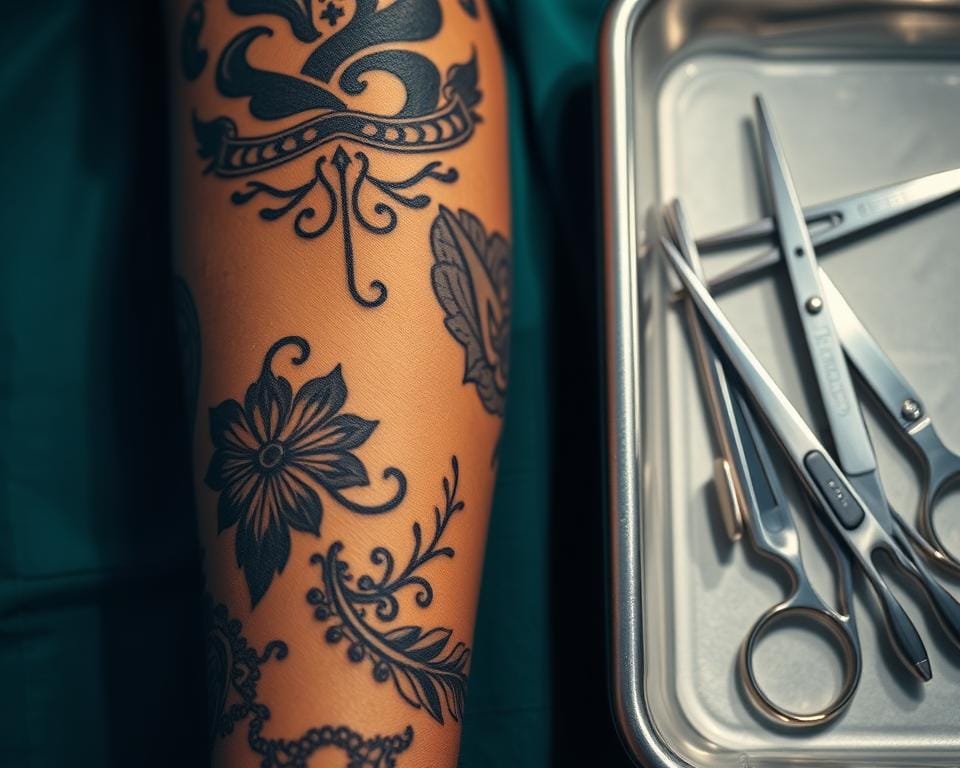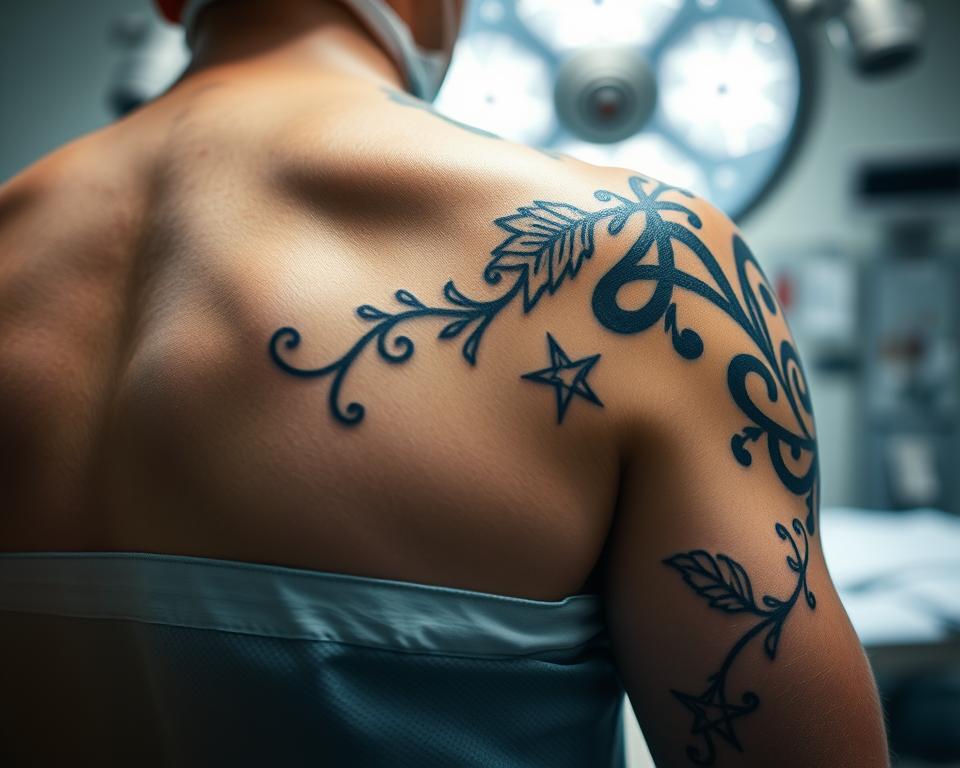Thinking about getting a tattoo before surgery? It’s key to know the risks. Tattoos before surgery can cause infections and slow healing. It’s important to think about these risks when deciding to get a tattoo before surgery.
When you think about tattoos before surgery, weigh the good against the bad. Tattoos can raise the risk of infection, which can make recovery longer. Always put your health first when deciding about tattoos before surgery.
It’s not wise to get a tattoo before surgery because of the infection risk. Being close to your ideal weight before surgery can help you heal fast.
Key Takeaways
- Avoid getting any kind of tattoo within 2 weeks prior to surgery to reduce the risk of pre-operative infection.
- Patients in higher weight ranges have greater risks attached to all forms of surgery, including plastic surgery.
- Optimal results are gained when patients are at an optimal weight, leading to quicker recovery times.
- Getting a tattoo before surgery can lead to complications, including infection and impaired healing.
- It’s essential to consider the timing of tattoos in relation to surgery to minimize the risk of infection and ensure proper healing.
- Can you have a tattoo before surgery? It’s crucial to weigh the potential benefits against the risks and prioritize your health and well-being.
Understanding the Relationship Between Tattoos and Surgery
Before getting a tattoo, think about how it might affect future surgeries. Tattoos and surgery have a complex relationship. Knowing this is key to making smart choices. Fresh tattoos can make healing after surgery harder.
It’s important to plan when you get a tattoo and when you’ll have surgery. Try to get your tattoo a few weeks before surgery. This lets the tattoo heal, reducing surgery risks. Tattoos near the surgery area can be a bigger problem.

The Impact of Fresh Tattoos on Surgical Procedures
Fresh tattoos can lead to infections and healing issues during surgery. It’s crucial to understand these risks. Knowing how tattoos and surgery interact helps you make better choices for your body.
Why Timing Matters for Your Safety
Timing is everything when getting a tattoo before surgery. Waiting until your tattoo heals can lower infection and healing risks. Thinking about the timing of your tattoo and surgery helps keep you safe.
The Risks of Getting a Tattoo Before Surgery
Thinking about getting a tattoo before surgery? It’s crucial to know the risks. The American Society of Plastic Surgeons says wait until after surgery for tattoos. The American Academy of Dermatology warns against tattoos before surgery because of infection and scarring risks.
Here are some key risks to think about:
- Infection risk: Tattoos before surgery can lead to infections, mainly if not cared for right.
- Healing complications: Tattoos can slow down healing, causing swelling, fluid buildup, and blood clots.
- Increased pain: Tattoos before surgery might make recovery pain worse.
Statistical data shows getting tattoos and surgeries close together raises infection risks. Bacteria causing staph infections are now resistant to common antibiotics. So, it’s vital to focus on wound care and hygiene.
To lower risks, wait at least six weeks before and after surgery for tattoos. This time allows for full healing and reduces complications. Knowing the risks helps you decide when to get a tattoo, keeping your health and safety first.
| Risk | Description |
|---|---|
| Infection risk | Increased risk of infection due to compromised wound healing |
| Healing complications | Impaired healing process, leading to increased swelling and pain |
| Increased pain | Higher pain levels during recovery due to tattoo and surgery |
Can You Have a Tattoo Before Surgery: Medical Expert Insights
Thinking about getting a tattoo before surgery? It’s key to talk to medical experts first. They’ll tell you about the risks and how to stay safe. Experts say it’s better to wait until after surgery to get a tattoo. This helps your body heal and lowers the chance of infection.
Surgeons suggest waiting at least three months after surgery for a tattoo. But, this time can change based on how fast you heal. Remember, there are no strict rules for tattooing yet. So, it’s important to find a skilled tattoo artist who knows what they’re doing.
What Surgeons Say About Pre-Surgery Tattoos
Surgeons warn that tattoos before surgery can cause problems. These include infections and slower healing. They advise patients to wait until after surgery for a tattoo. This way, you can avoid risks and have a smooth surgery.
Understanding the Medical Recommendations
Medical advice on tattoos before surgery varies. But most doctors agree waiting is safest. Talk to your surgeon to figure out the best plan. Following their advice helps you stay healthy and enjoy your tattoo safely.

How Fresh Tattoos Affect Your Immune System
When you get a fresh tattoo, your body sees the ink as something foreign. This makes your immune system react, which can slow down healing. Studies show that this reaction isn’t just at the tattoo site. It happens all over your body.
Getting more tattoos can make your immune system even more active. This is because it remembers past tattoos. Also, having tattoos can lower your cortisol levels. Cortisol is a hormone that helps you deal with stress.

- Immune system activity is not only localized at the tattoo site but is activated throughout the entire body.
- The immune response to tattoos is cumulative over time.
- Individuals with tattoos may experience decreased levels of cortisol post-tattooing.
Knowing how tattoos affect your immune system is key. It helps you decide if getting a tattoo is right for you, even if your immune system is weak. By understanding these points, you can reduce risks and help your tattoo heal better.
Optimal Timing: When to Schedule Your Tattoo Around Surgery
It’s important to know when to get a tattoo before or after surgery. This helps avoid risks. You should wait six weeks before surgery and also six weeks after. This ensures your safety.
Talking to a plastic surgeon about your tattoo plans is key. They can guide you based on your health and surgery type. This helps avoid problems like infections and swelling.

- Wait at least six weeks before surgery to get a tattoo
- Wait at least six weeks after surgery to get a tattoo
- Discuss your tattoo plans with a plastic surgeon to ensure safe timing
| Pre-Surgery Timeline | Post-Surgery Waiting Periods |
|---|---|
| 6 weeks | 6 weeks |
By following these guidelines, you can have a safe tattoo experience around surgery. It’s all about timing.
The Healing Process: Why Timing is Critical
The healing process after surgery is key to your health. It’s important to let your body heal without stress from tattoos. Studies show that starting treatments before surgery can help wounds heal better and reduce complications.
For instance, a review of 13 studies showed that 8 of them saw better wound healing with pre-surgery treatments. Giving Valium or using warm techniques before surgery can also help. Vitamins like Vitamin C or E can improve healing and make scars look better.

Here are some important findings about healing and timing: * 8 out of 13 studies found better wound healing with pre-surgery treatments * Giving 10mg of Valium an hour before surgery lowered anxiety and infections * Warming patients before surgery helped with healing, as seen in studies on infections and pain * Using Vitamin E twice daily for 2 weeks before and 30 days after surgery improved healing and looks at 6 months
| Intervention | Result |
|---|---|
| Preoperative warming | Improved wound healing |
| Valium administration | Reduced anxiety and surgical site infections |
| Vitamin E application | Improved wound healing and cosmetic results |
In conclusion, healing after surgery is crucial, and timing is key. By understanding the value of pre-surgery treatments, you can help your body heal. This can reduce complications and make your recovery smoother.
Preparing Your Body for Surgery: Best Practices
Getting ready for surgery means focusing on your body’s health. It’s key to follow the best practices and health guidelines before surgery. This helps you recover smoothly and safely.
Essential Pre-Surgery Health Guidelines
Important health tips before surgery include:
- Stopping certain medications that may interfere with the surgery or recovery process
- Avoiding tobacco and nicotine products to promote healing and reduce complications
- Maintaining a healthy diet and staying hydrated to support your body’s needs
Lifestyle Adjustments to Consider
It’s also important to make lifestyle changes for recovery. This might mean:
- Taking time off work to rest and recover
- Avoiding heavy lifting and strenuous activities
- Preparing meals and freezing them in advance to ensure a smooth recovery

By following these tips, you can get your body ready for surgery. This will help you recover well. Always talk to your healthcare provider for specific advice.
| Pre-Surgery Guidelines | Importance |
|---|---|
| Stop certain medications | High |
| Avoid tobacco and nicotine | High |
| Maintain a healthy diet | Medium |
Alternative Options for Body Art Enthusiasts
If you love body art, you might be looking for safe and cool ways to express yourself. Tattoos and surgery can be risky, so it’s smart to look at other choices. These options let you show your style without the dangers of tattoos and surgery.
Scarification, transdermal implants, and other body mods are great alternatives. They offer a creative way to express yourself without the risks. For instance, getting your ears pierced is a popular choice that’s safer than tattoos.

Also, you can try painting or drawing to show your creativity. These arts are safe and let you express yourself without the risks of tattoos and surgery. Exploring these options helps you find a safe way to be creative and unique.
Some popular choices for body art lovers include:
- Scarification
- Transdermal implants
- Ear piercing
- Other forms of body modification
These options are creative and safe, unlike tattoos and surgery. By looking at these alternatives, you can make smart choices about your body art. This way, you can express yourself safely and uniquely.
Common Complications When Mixing Tattoos and Surgery
It’s important to know about potential risks before getting a tattoo before surgery. You should understand the risks of infection and how tattoos might affect surgery outcomes. Web sources say mixing tattoos and surgery can lead to infection risks and affect surgery outcomes.
Some common issues include:
- Infection risks: Fresh tattoos are open wounds, and surgery can increase the risk of infection.
- Impact on surgical outcomes: Tattoos can affect the healing process and outcome of surgery.
- Allergic reactions: You may be allergic to tattoo ink, which can cause an allergic reaction during surgery.
Knowing these complications helps you avoid risks and recover smoothly. Talk to your healthcare provider about your tattoo and any concerns before surgery. They can help you minimize risks and get the best results.
Here is a table summarizing some of the common complications:
| Complication | Description |
|---|---|
| Infection risks | Fresh tattoos are open wounds, and surgery can increase the risk of infection. |
| Impact on surgical outcomes | Tattoos can affect the healing process and outcome of surgery. |
| Allergic reactions | You may be allergic to tattoo ink, which can cause an allergic reaction during surgery. |
What to Tell Your Healthcare Provider About Your Tattoos
When you’re getting ready for surgery, telling your healthcare provider about your tattoos is key. It’s important to share your tattoo history. This helps your healthcare provider understand any risks or complications that might come up.
Here are some important details to share:
- The location and size of your tattoos
- The age of your tattoos
- Any complications or reactions you’ve experienced with your tattoos
Being open about your tattoos helps your healthcare provider make better decisions for you. They want to ensure your safety and well-being. So, don’t hesitate to share.
Also, ask your healthcare provider about any special concerns or precautions they might have. Working together, you can make sure your surgery goes smoothly and safely.
| Information to Share | Why it’s Important |
|---|---|
| Tattoo location and size | To assess potential risks and complications |
| Tattoo age | To understand potential healing and reaction times |
| Complications or reactions | To inform healthcare provider of potential risks and take necessary precautions |
Recovery Success: Managing Existing Tattoos During Surgery
When you’re getting ready for surgery, think about how your tattoos might affect your recovery. It’s important to plan carefully and take good care of your tattoos after surgery. This means protecting them during medical procedures and following tips for aftercare to avoid problems.
To make sure you recover well, follow these guidelines for managing tattoos during surgery:
- Protect your tattoos from infection and damage during medical procedures
- Follow post-surgery care tips to promote healing and prevent complications
- Tell your healthcare provider about your tattoos and any worries you have
By doing these things, you can help your recovery go smoothly and reduce risks from your tattoos. Always put post-surgery care first and follow your healthcare provider’s advice to heal well and avoid infection.
It’s also key to know the risks of tattoos during surgery, like infection and allergic reactions. By understanding these risks and taking steps to avoid them, you can have a successful recovery and get the best results from your surgery.
| Post-Surgery Care Tips | Importance |
|---|---|
| Keep the tattoo clean and dry | High |
| Avoid direct sunlight and UV radiation | High |
| Follow a healthy diet and lifestyle | Medium |
Conclusion
When deciding on a tattoo before surgery, your health is most important. Knowing the risks and following expert advice helps you make a good choice. This choice should match your personal style and medical needs.
Tattoos are a great way to express yourself, but timing is everything. Doctors usually say wait at least six weeks before surgery. This helps avoid infections and other problems.
Talking openly with your doctors is crucial. Tell them about any tattoos you have or plan to get. This way, they can take the best care of you during your surgery. With careful planning, you can keep your tattoos and stay safe.
FAQ
Can I get a tattoo before surgery?
Getting a tattoo before surgery is a big decision. You need to think about the risks and what your doctor says. This ensures your safety and a good recovery.
How long after getting a tattoo can I have surgery?
Waiting time varies with surgery types. But, it’s best to wait 4-6 weeks after a tattoo before surgery.
What happens if you have surgery over a tattoo?
Surgery over a tattoo can lead to problems. These include infection, slow healing, and issues with the surgery. Always tell your doctor about tattoos and follow their advice.
Do tattoos interfere with medical procedures?
Yes, tattoos can affect some medical tests and surgeries. Always tell your doctor about tattoos before any medical procedure.
Can you go under anesthesia when getting a tattoo?
No, you shouldn’t get anesthesia for a tattoo. Tattoos aren’t medical procedures. The risks of anesthesia outweigh any benefits.
What you cannot do after a tattoo?
After a tattoo, avoid direct sunlight and water. Also, don’t do strenuous activities. These can harm the healing process.
Can I get a tattoo before top surgery?
It’s best to avoid tattoos before surgery, including top surgery. Timing is key to avoid complications.
Should I plan a tattoo before or after your plastic surgery?
Plan your tattoo after surgery and full recovery. This ensures a smooth healing process and reduces risks.
Is it okay to get tattoos before plastic surgery?
Getting tattoos before surgery is not recommended. Timing and medical advice are crucial for safety and recovery.
Is it okay to get tattoos after plastic surgery?
Getting tattoos after surgery is safer. It ensures both tattoo and surgical site healing processes are not affected.
Is it advisable to ask my plastic surgeon if I can get a tattoo?
Yes, always ask your plastic surgeon about tattoos, near the surgical site. They can guide on timing and precautions.









